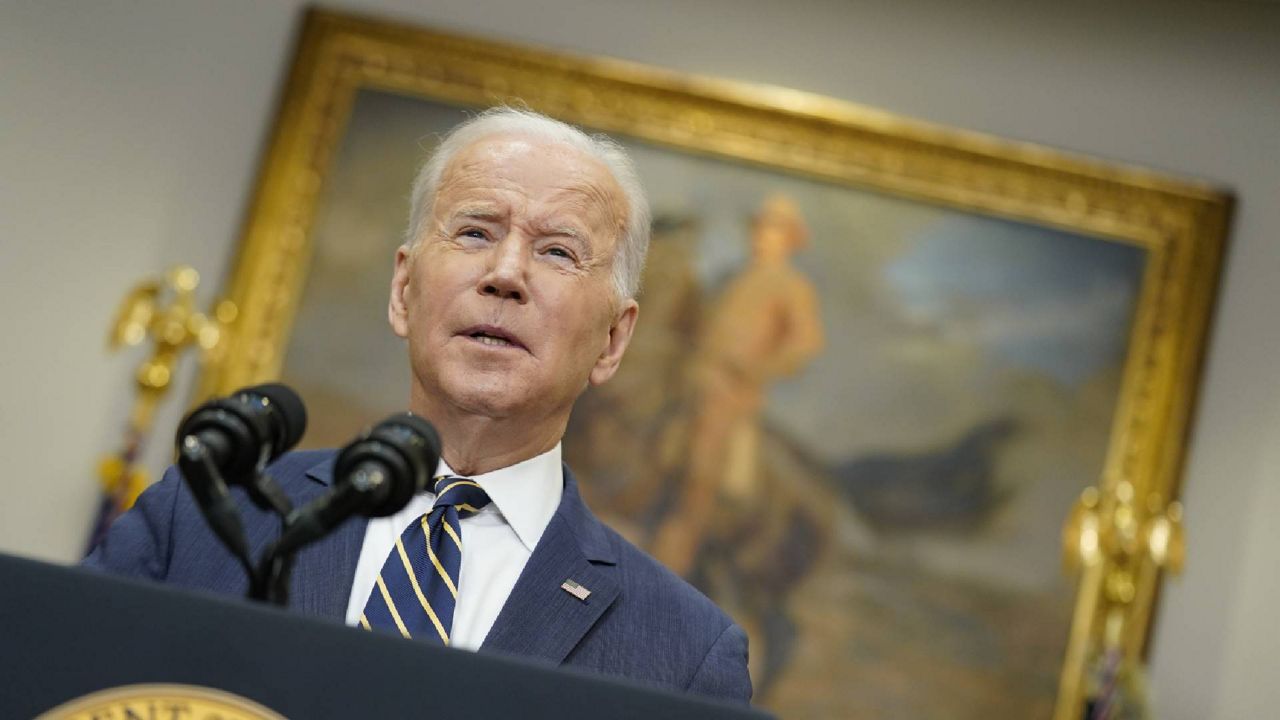President Joe Biden announced Friday that, along with the European Union and the Group of Seven countries, the U.S. will move to revoke "most favored nation" trade status for Russia over its invasion of Ukraine.
What You Need To Know
- President Joe Biden announced Friday that along with the European Union and the Group of Seven countries, the U.S. will move to revoke "most favored nation" trade status for Russia over its invasion of Ukraine
- Stripping most favored nation status would allow the U.S. and allies to impose higher tariffs on some Russian imports
- The move will also ban U.S. imports of some of Russia'ssignature products: seafood, spirits including vodka and non-industrial diamonds
- Biden's move comes as bipartisan pressure has been building in Washington to revoke what is formally known as "permanent normal trade relations" with Russia
Stripping most favored nation status from Russia would allow the U.S. and allies to impose higher tariffs on some Russian imports, increasing the isolation of the Russian economy in retaliation for the invasion.
The new move in coordination with G7 countries will further isolate Russia from nations that make up half of the global economy, Biden said in a speech Friday, calling it "another crushing blow to the Russian economy."
"Putin is an aggressor. He is the aggressor, and Putin must pay the price," the president said.
The U.S. will also ban imports of some of Russia's signature products: seafood, spirits including vodka and non-industrial diamonds, altogether amounting to $1 billion in export revenues lost, according to the White House. And the U.S. will also restrict the export of luxury goods to Russia, including items such as watches, high-end vehicles, clothes and jewelry.
Biden's move comes as bipartisan pressure has been building in Washington to revoke what is formally known as "permanent normal trade relations" with Russia. Ukrainian President Volodymyr Zelenskyy pressed the U.S. and allies to take the action against Russia in remarks to Congress over the weekend. It follows days after the Biden moved to ban imports of Russian oil and gas products.
Biden, after initially slow-walking congressional efforts to take the trade action against Russia, was set to embrace lawmaker efforts to do just that on Friday.
The sanctions on imports of Russian oil, gas and coal already cut off about 60% of U.S. imports from the country.
Credit rating agencies have downgraded Russia to "junk" status, and the value of its ruble is now less than one U.S. penny.
Biden on Friday also said he had a conversation with Zelenskyy earlier in the morning ahead of the economic announcement, adding that he reaffirmed that the U.S. "stands with the people of Ukraine."
"The American people are united, the world is united, and we stand with the people of Ukraine," Biden said. "We will not let autocrats and would-be emperors dictate the direction of the world. Democracies are rising to meet this moment. "
Most favored nation status requires a country to treat all countries with that designation the same. Members of the World Trade Organization share that status, though some countries have special privileges due to their status as developing economies.
Cuba and North Korea do not have MFN status.
U.S. tariffs on Russian goods vary, but many of the most important imports are either duty free or would face a negligible increase in such taxes, Ed Gresser of the Progressive Policy Institute in Washington, D.C., said in an online post.
That includes imports of uranium, rhodium and palladium, king crabs and silver bullion.
Instead of the current tariff rate, buyers of Russian goods would pay rates established under the Smoot-Hawley Tariff Act of 1930, which disrupted trade during the Great Depression.
Duties would surge from zero to 30% for certain kinds of ammunition and to 10% for some kinds of diamonds.
On Monday, Democrats on the powerful House Ways & Means Committee posted, then removed, an announcement on a bipartisan bill to ban Russian oil imports and slap further trade sanctions on the country, according to an aide, because of pushback from the White House against acting before Biden had coordinated with allies and reached a decision on both matters. The House voted Wednesday on a narrower bill to ban Russian energy imports after Biden instituted the ban by executive order.
Canada was the first major U.S. ally to remove most favored nation status for Russia last week.



